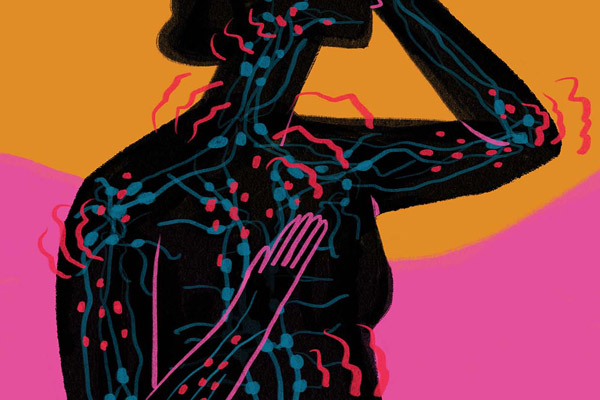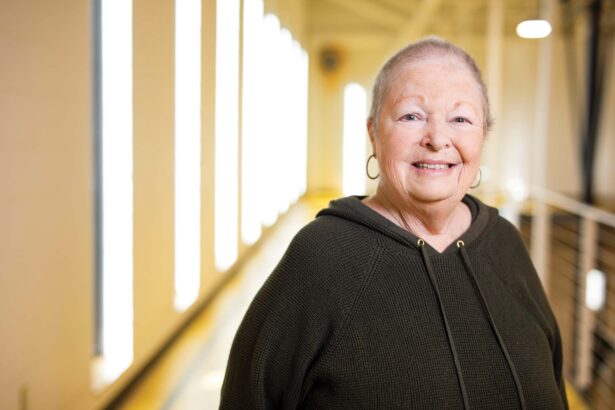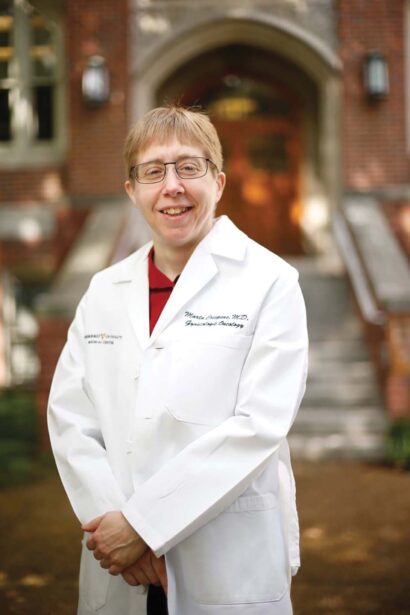Chemo Allergy
Researchers seek biomarkers to identify patients with chemotherapy allergies
January 14, 2025 | Nancy Humphrey

A true allergy to a medication is not that common, and when it happens, there’s often a work-around, like substituting a drug in another class.
But what if you’re a patient with cancer and the drug you’re allergic to is a chemotherapy agent that offers the best, and sometimes only, chance of saving your life?
Physicians in the Drug Allergy Clinic at Vanderbilt University Medical Center are studying why that happens and how to best help patients tolerate the allergy-inducing chemotherapy.
When your immune system mistakenly identifies a drug as a harmful substance, like it does for a virus or bacteria, it may develop an allergy antibody specific to that drug.
The next time you take the drug, the antibodies direct the immune system to release an attack on the substance, and an allergic reaction occurs. While the reaction may only result in itching or hives, sometimes it’s a more severe reaction that can lead to anaphylaxis, a life-threatening allergic reaction that can lead to low blood pressure, unconsciousness or even death.
Sam Manning, a 77-year-old retired real estate broker from Nashville, was diagnosed in April 2021 with Stage 4 peritoneal carcinoma, a gynecological cancer that arose from the lining of her abdomen.
But one day, after several treatments, the chemo- therapy agent she was prescribed, carboplatin, resulted in anaphylaxis.
“There are certain drugs we give patients when we are treating their cancer that have a higher chance of the patient eventually becoming allergic to that drug. It’s particularly problematic for women getting treated with platinum drugs for ovarian cancer or other gynecological malignancies,” said Cosby Stone Jr., MD, MPH, assistant professor of Medicine in the Division of Allergy, Pulmonary and Critical Care Medicine. “Losing access to a drug that is working for your cancer can be a disaster. You can end up having a bad outcome.”

Stone said that chemotherapy drugs are the fifth most common category of drugs that result in patients having anaphylaxis.
“Chemotherapy reactions are also more likely to be fatal if we don’t get them under control, and that’s because the patients are sicker to begin with,” he said.
Manning’s oncologist, Marta Crispens, MD, professor of Obstetrics and Gynecology, director of the
Division of Gynecologic Oncology and director of the Gynecologic Oncology Fellowship, said platinum drugs, specifically carboplatin and cisplatin, are the most active chemotherapy agents for cancers such as epithelial, ovarian and cervical cancers and are critical to the treatment of many other gynecological cancers such as endometrial cancer.
“Allergic reactions can limit our ability to use these critical drugs,” she said. “Being able to use these drugs in patients in whom anaphylactic reactions might have previously prevented their use allows us to offer patients their best chance of response and cure.”
A Wicked Strong Allergy
In 2021 Manning began having severe abdominal pains that became progressively worse. Her daughter, Tasha, took her to an urgent care clinic near her home, and they sent her to Stonecrest Hospital’s emergency room in Smyrna where 24 hours later they determined that she had a large tumor in her abdomen.
After some insurance issues were resolved, she was sent to Vanderbilt-Ingram Cancer Center where she had more scans and met with her medical team. The 9 ½ pound tumor was removed by Marcus Tan, MD, associate professor of Surgery.
She was told she had one to two years to live and began chemotherapy after recovering from the surgery. But, after previously tolerating carboplatin for a while, one day she experienced a reaction to it. She broke out in hives over her entire body, wound up having a severe anaphylactic reaction to carboplatin, and had to be admitted to the hospital.
“The more doses of carboplatin a patient receives, the more likely they are to be allergic,” Stone said. “If you’ve had zero doses of carboplatin, your chance of being allergic is less than 1%. If you’ve had seven doses, it goes up to 27%; 10 doses, about 50%.”
“Sam had a wicked strong allergy, even stronger than the average allergy,” Stone remembers. “We started working through the process of desensitizing her so that she could still get carboplatin for her cancer. However, even with the first desensitization, she still had some very strong symptoms that first time.”
Stone, who called the hospital to check on Manning and was told she wasn’t doing well, spent the night in the cancer unit with her and eventually came up with a desensitization protocol to allow her to still receive carboplatin despite her allergy.
“She still had some breakthrough symptoms despite desensitization that were pretty bad. We treated the symptoms; I kept her company until she felt better; and that’s how we got her through that first full treatment after becoming allergic,” he said. “After that, we kept working on it together. Each treatment got slowly better as we worked on controlling her allergy symptoms with an improved, personalized protocol.”
Diluting the chemo
The Drug Allergy Clinic began treating patients with chemotherapy allergies shortly after the COVID-19 pandemic restrictions eased.

“We trained our nurses and pharmacists, working with our gynecologic oncologists and built this program from scratch. We were able to take advantage of the opportunity to implement some of the most up-to-date protocols available in the drug allergy research space,” Stone said.
When a patient is allergic to a chemotherapy drug, the VUMC drug allergy and pharmacy teams take the drug that the patient is allergic to, at the concentration they need, and use a protocol that dilutes it by a factor of 10, then a factor of 100. Then, this very diluted drug is slowly administered to the patient.
“Over the course of three hours, we slowly double the concentration of the drug the patient is getting, starting with the really diluted drug, and slowly bumping it up every 15 minutes until they are at the concentration they need to actually get the full treatment,” Stone explained.
To do this, a patient must be admitted to the hospital and have a nurse dedicated solely to their care at the bedside.
“Depending on how well the patient tolerates it, we keep doing desensitization in the hospital, but some patients are able to tolerate it well enough to go back to the outpatient infusion center for the same protocol,” Stone said.
The Whys and Hows
The team is still searching for answers as to why patients become allergic to the platinum drugs.
“Either the interaction of the drug with the body creates a new allergen your body recognizes, or the repeated exposure makes it possible for it be recognized as an allergen. Those are questions we’re trying to answer,” Stone said.
And why diluting the chemotherapy then slowly bumping it back up works has not fully been determined.
“We can do more than we can understand,” Stone said. “We can make a patient not react to chemo, even when they’ve had anaphylaxis, or if they do react despite a desensitization, it’s not so bad that we can’t control it. But we don’t know exactly why it works. Honestly, the clinical care is a little further than the science, but we are trying to fix that,” he said.
“We think that desensitization gets below the patient’s reaction threshold, such that giving them the drug is more like a controlled burn rather than an explosion, and they have a reaction that’s lower than their level of ability to detect or experience. We control the reaction, so it doesn’t come on all at once, so all we have to do, if they have symptoms, is give them some antihistamines and hold off on the drug for a little bit, then restart it.”
Not all patients who are allergic to their chemotherapy drugs have as strong of a reaction as Manning’s, Stone said.
“I was a mess,” Manning remembers. “Dr. Crispy (her nickname for Crispens) told me that carboplatin was the only chemo medicine that would do me any good with my cancer. They were able to keep using it, but only because Dr. Stone kept tweaking it and improving how they administered my allergy treatments with it. Every time, it got better.”
Stone said the team got Manning to the point of only minor symptoms with each chemotherapy treatment. “It allowed her to get another 10-20 treatments with this key drug for her cancer, despite being very allergic to it.”

Her case has provided the drug allergy team with valuable information on how to better treat patients who are allergic to their chemotherapy.
“Mrs. Manning’s allergy was so strong that we had to pull out all our tricks, and then we were able to apply them to other patients, with great benefit — in particular which additional medicines (extra antihistamines, montelukast, etc.) patients need to take for several days beforehand so they can get through their desensitization more smoothly,” Stone said.
Tolerable and Safe
About 95% of patients treated for chemotherapy allergies at VUMC have been patients with ovarian and endometrial cancers, but the team has also helped patients with gastrointestinal and head and neck cancers.
“This a patient-centered approach that allows the patient to keep getting the drug that’s working for their cancer. The whole program is built around trying to achieve two goals: making it as tolerable for the patient as possible and making it as safe for the patient as possible, despite the fact that they are allergic to this drug that they have to take,” Stone said.
Stone, Scott Smith, MD, PhD, associate professor of Medicine, and Elizabeth Phillips, MD, the John A. Oates Professor of Clinical Research and professor of Medicine, Dermatology, Pharmacology and Pathology, Microbiology and Immunology, have a pilot grant funded by Chic Awearness to study chemotherapy allergy at VUMC.
Stone said he’s hopeful research can pinpoint the markers of these reactions and find the allergy antibodies patients are making against these drugs, so that a blood test can be developed, or a treatment can be identified that blocks the reaction.
“The first rule is: Take care of the patient. Do the best you can for the patient. Second: Use science to figure out how to do better next time,” he said.
Since most of the chemotherapy drugs that cause allergies are drugs that have been around for some time, the ultimate work-around on the drug allergy problem may be developing new drugs that don’t result in allergic reactions.
“I don’t mind if the cancer doctors make me obsolete by coming up with better drugs for these cancers, but we’ll take care of all the patients who need us until they do,” Stone said.
Manning, who credits Stone and Crispens with saving her life, recently began immunotherapy at Vanderbilt-Ingram and is hopeful that will give her more time.
“I’ll never be cured. I’ve lost all my hair. I don’t have the energy I used to have, and I can’t do the things I used to do,” she said. “I used to be a big boater. I had a houseboat on the lake, and I can’t do any of that anymore. Cancer has dragged me down. But I’m here. I’m still here.”
